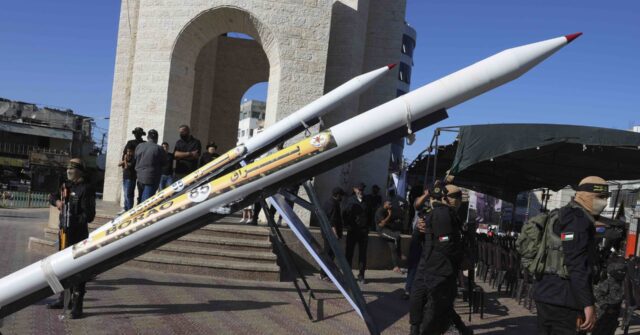On Friday, the Israel Defense Forces (IDF) announced the elimination of Khalid Abu Daqqa, the leader of the rocket unit of Palestinian Islamic Jihad (PIJ), recognized as a terrorist group backed by Iran. This development follows the October 7 attacks in which Islamist militants launched assaults against Israeli targets. The IDF, in conjunction with the Israel Security Agency (ISA), confirmed that the operation occurred in the Humanitarian Area of Deir el-Balah, central Gaza, marking a significant strike against ongoing terrorist activities. The announcement reflects a broader Israeli campaign targeting leadership figures within militant organizations operating in and around Gaza, aiming to disrupt their capabilities to launch attacks against Israeli civilians and soldiers.
Khalid Abu Daqqa was linked to a series of rocket attacks orchestrated against southern Israeli communities, particularly after the October 7 incident. The IDF and ISA’s coordinated mission sought to strategically eliminate threats without escalating civilian casulties in the densely populated area of Gaza. Advanced intelligence-gathering and aerial surveillance played a critical role in pinpointing Abu Daqqa’s location and facilitating precise strikes. The efforts involved comprehensive planning to ensure that precision munitions minimized collateral damage, reflecting the IDF’s stated commitment to limit harm to non-combatants, even within operationally challenging environments.
In addition to Abu Daqqa’s death, reports indicated that five other terrorists were killed during the airstrike, signaling the aggressive nature of Israel’s military response to ongoing threats. This move demonstrates the IDF’s operational readiness to carry out strikes against figures deemed responsible for orchestrating attacks against Israel. The announcement underlines Israel’s broader strategy of targeting not just operatives but also key personnel in these militant organizations, thereby seeking to weaken their operational capabilities and deter future aggression from Gaza-based groups.
Since the recent upsurge in violence that culminated in the October 7 attacks, the conflict dynamics between Israel and Palestinian factions have intensified. The ongoing hostilities highlight the complexities of urban warfare, particularly regarding the use of humanitarian zones such as hospitals and schools for military purposes. The Israeli government has continually pointed out that militant groups, including PIJ, frequently exploit civilian infrastructures, complicating military operations and increasing the risk to non-combatants during confrontations. This assertion raises critical concerns regarding the nature of contemporary warfare and the ethical considerations surrounding civilian protection amid active conflict.
The strategic operations conducted by the IDF against PIJ targets are set against a backdrop of a protracted conflict characterized by cycles of retaliation and violence. Israel’s determination to disrupt terrorist activities and prevent rocket fire into its territory is a cornerstone of its national security policy. However, these military actions often elicit responses from Palestinian factions, leading to further escalations and a humanitarian crisis in Gaza. As Israel progresses with its military campaigns, the international community continues to monitor the humanitarian implications of these actions, prompting debates on military ethics and the responsibilities of state actors in conflict zones.
In summary, the recent airstrike that killed Khalid Abu Daqqa reflects Israel’s ongoing commitment to countering terrorism while grappling with the complexities of urban warfare in a densely populated region. As the IDF aims to dismantle the operational capacity of groups like Palestinian Islamic Jihad, the risks to civilians remain a significant concern. The conflict’s multifaceted nature, rooted in historical grievances and geopolitical factors, underscores the need for comprehensive strategies that address both security needs and humanitarian considerations in the volatile region. The situation highlights the profound challenges of achieving lasting peace amid ongoing violence and retaliatory dynamics in the Israeli-Palestinian conflict.

